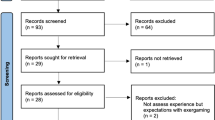Abstract
Video exercise games (exergames) are becoming increasingly popular among elderly people. Many elderly experience reduced balance and muscle strength which make them at increased risk of falling. Muscle strength and balance training are the key components for preventing function decline and falls at old age. Exergames that are to be used among elderly users should be specifically designed for this group of people. This study aims to design and evaluate an exergame concept developed to fit the need and preferences of elderly users. First, seven elderly people tested three commercially available exergames. Feedback from focus group interviews revealed that the design of the existing exergames should be simplified and more closely related to activities that can be associated with older people’s daily life. Based on the feedback a new exergame concept “in nature” was designed. The new exergame concept had a simple design, and included balance and muscle strengthening exercises related to real life activities. In the results of the workshop, the study provides eight design recommendations for exergame design for seniors.
Access this chapter
Tax calculation will be finalised at checkout
Purchases are for personal use only
Similar content being viewed by others
References
Factbox on video game industry. http://in.reuters.com/article/2013/06/10/gameshow-e-idINDEE9590DW20130610. Accessed 14 November 2013
Billis, A.S., Konstantinidis, E.I., Mouzakidis, C., Tsolaki, M.N., Pappas, C., Bamidis, P.D.: A game-like interface for training seniors’ dynamic balance and coordination. In: Bamidis, P.D., Pallikarakis, N. (eds.) XII Mediterranean Conference on Medical and Biological Engineering and Computing 2010. Proceedings of IFMBE, vol. 29, pp. 691–694. Springer, Heidelberg (2010)
Gillespie, L.D., Robertson, MC., Gillespie, Sherrington, C., Gates, S., Clemson, L.M., Lamb, S.E.: Interventions for preventing falls in older people living in the community. Cochrane Database Syst. Rev. 2(CD007146) (2009)
Rosenberg, D., Depp, C.A., Vahia, I.V., Reichstadt, J., Palmer, B.W., Kerr, J., Jeste, D.V.: Exergames for subsyndromal depression in older adults: A pilot study of a novel intervention. Am. J. Geriatr. Psychiatry 18(3), 221–226 (2010)
Jung, Y., Li, K.J., Janissa, N.S., Gladys, W.L.C., Lee, K.M.: Games for a better life: effects of playing Wii games on the well-being of seniors in a long-term care facility. In: Proceedings of the Sixth Australasian Conference on Interactive Entertainment. ACM (2009)
Schoene, D., Lord, S.R., Delbaere, K., Severino, C., Davies, T.A., Smith, S.T.: A randomized controlled pilot study of home-based step training in older people using videogame technology. PLoS ONE 8(3), e57734 (2013)
Maillot, P., Perrot, A., Hartley, A.: Effects of interactive physical-activity video-game training on physical and cognitive function in older adults. Psychol. Aging 27(3), 589 (2012)
Anderson-Hanley, C., Arciero, P.J., Brickman, A.M., Nimon, J.P., Okuma, N., Westen, S.C., Zimmerman, E.A.: Exergaming and older adult cognition: a cluster randomized clinical trial. Am. J. Prev. Med. 42(2), 109–119 (2012)
Gerling, K.M., Schild, J., Masuch, M.: Exergame design for elderly users: the case study of silverbalance. In: Proceedings of the 7th International Conference on Advances in Computer Entertainment Technology, pp. 66–69. ACM, Taipei, Taiwan (2010)
Jongman, V., Lamoth, C.J.C., Van Keeken, H., Caljouw, S.R.: Postural control of elderly: moving to predictable and unpredictable targets. Stud. Health Technol. Inf. 181, 93–97 (2012)
Nawaz, A., Skjaeret, N., Ystmark, K., Helbostad, J.L., Vereijken, B., Svanaes, D.: Assessing seniors’ user experience (UX) of exergames for balance training. In: Proceedings of the 8th Nordic Conference on Human-Computer Interaction: Fun, Fast, Foundational, pp. 578–587. ACM, Helsinki, Finland (2014). doi:10.1145/2639189.2639235
Cornejo, R., Hernández, D., Favela, J., Tentori, M., Ochoa, S.: Persuading older adults to socialize and exercise through ambient games. In: 6th International Conference on Pervasive Computing Technologies for Healthcare (PervasiveHealth), pp. 215–218. IEEE, May 2012
Skjaeret, N., Nawaz, A., Ystmark, K., Dahl, Y., Helbostad, J.L., Svanaes, D., Vereijken, B.: Designing for movement quality in exergames: lessons learned from observing senior citizens playing stepping games. Gerontology 61(2), 186–194 (2015)
Proffitt, R., Lange, B.: User centered design and development of a game for exercise in older adults. Int. J. Technol. Knowl. Soc. 8(5), 95–112 (2012)
ISO 9241: Ergonomics of Human–System Interaction—Part 210: Human-Centred Design for Interactive Systems. International Organization for Standardization (ISO), Geneva, Switzerland (2010)
Houde, S., Hill, C.: What do prototypes prototype. In: Helander, M., Landauer, T., Prabhu, P. (eds.) Handbook of Human-Computer Interaction, vol. 2, pp. 367–381. Elsevier Science, Cambridge (1997)
Nawaz, A., Waerstad, M., Omholt, K., Helbostad, J.L., Vereijken, B., Skjaeret, Kristiansen, L.: Designing simplified exergame for muscle and balance training in seniors: a concept of ‘out in nature’. In: Proceedings of the 8th International Conference on Pervasive Computing Technologies for Healthcare, pp. 309–312. Germany. ICST (Institute for Computer Sciences, Social-Informatics and Telecommunications Engineering), Oldenburg (2014). doi:10.4108/icst.pervasivehealth.2014.255269
Acknowledgements
The research leading to these results has received funding from the European Union Seventh Framework Programme (FP7/2007-2013) under grant agreement FARSEEING n° 288940. FARSEEING aims to promote better prediction, identification and prevention of falls with focus on ICT devices. We thank the older seniors from Seniornett for taking part in the project.
Author information
Authors and Affiliations
Corresponding author
Editor information
Editors and Affiliations
Rights and permissions
Copyright information
© 2015 Springer-Verlag Berlin Heidelberg
About this paper
Cite this paper
Nawaz, A. et al. (2015). An Exergame Concept for Improving Balance in Elderly People. In: Fardoun, H., R. Penichet, V., Alghazzawi, D. (eds) ICTs for Improving Patients Rehabilitation Research Techniques. REHAB 2014. Communications in Computer and Information Science, vol 515. Springer, Berlin, Heidelberg. https://doi.org/10.1007/978-3-662-48645-0_6
Download citation
DOI: https://doi.org/10.1007/978-3-662-48645-0_6
Published:
Publisher Name: Springer, Berlin, Heidelberg
Print ISBN: 978-3-662-48644-3
Online ISBN: 978-3-662-48645-0
eBook Packages: Computer ScienceComputer Science (R0)




